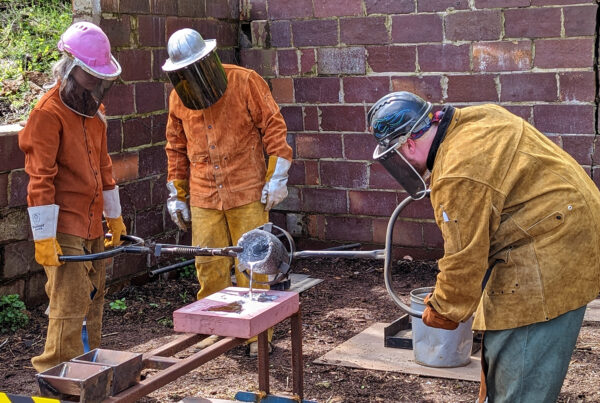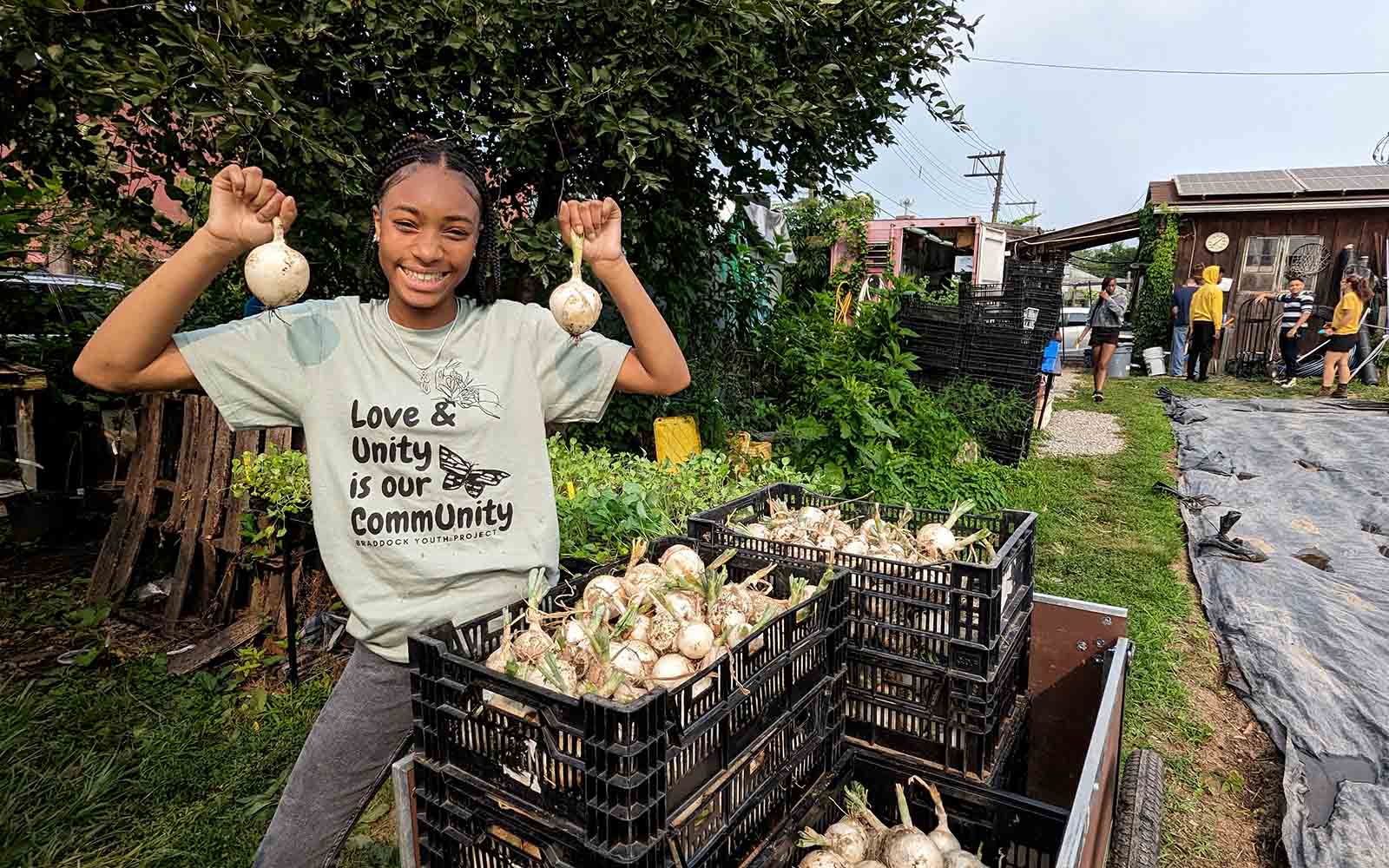
A teen with the Braddock Youth Projects displays the onions she picked on a recent morning at Braddock Farms.
Community Spotlight—Grow Pittsburgh
The Community Spotlight series features the efforts of Rivers of Steel’s partner organizations, along with collaborative partnerships, that reflect the diversity and vibrancy of the communities within the Rivers of Steel National Heritage Area.
By Gita Michulka, Contributing Writer
Grow Pittsburgh’s Urban Farmers in Training program Connects Teens to their Communities through Local Food Systems
On a sunny July morning at Braddock Farms, a group of teenagers is hard at work harvesting onions. Their crop, destined for local farm stands, is just one part of the urban agriculture ecosystem that they’ll learn about throughout the year.
The students are members of Grow Pittsburgh’s Urban Farmers in Training (UFIT), a workforce development program that immerses high school participants between the ages of 14 – 18 in the workings of a farm, connecting them to the process of growing and distributing food while deepening career readiness skills.
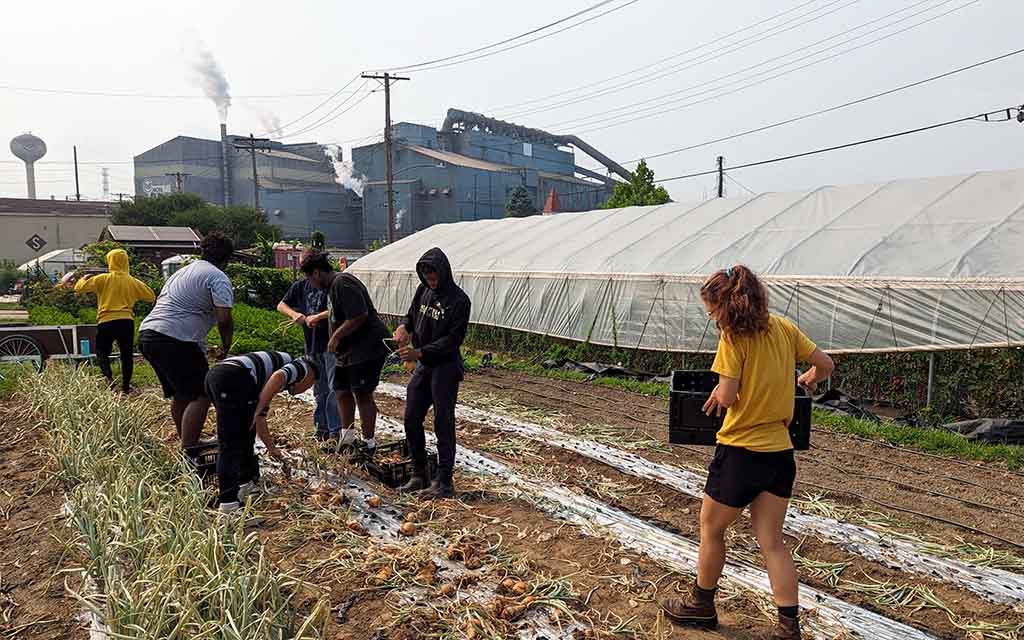
A group of teens with the Braddock Youth Project harvest onions at Braddock Farms, part of Grow Pittsburgh’s Urban Farmers in Training program. The Edger Thompson Works is seen in the background.
This year, Grow Pittsburgh is partnering with the Braddock Youth Project and Homewood Children’s Village to recruit students for the UFIT program, which is partly funded by Rivers of Steel’s Mini-Grant Program.
During the course of the growing season, the UFIT students are hands on at the farm, preparing the space, seeding crops, maintaining the gardens, and harvesting what grows. They also interact with the community by working regular shifts at the organization’s low-cost farm stands, distributing fresh food and providing cooking demonstrations. At the same time, they are building relationships with those community members and learning about the business side of farm management.
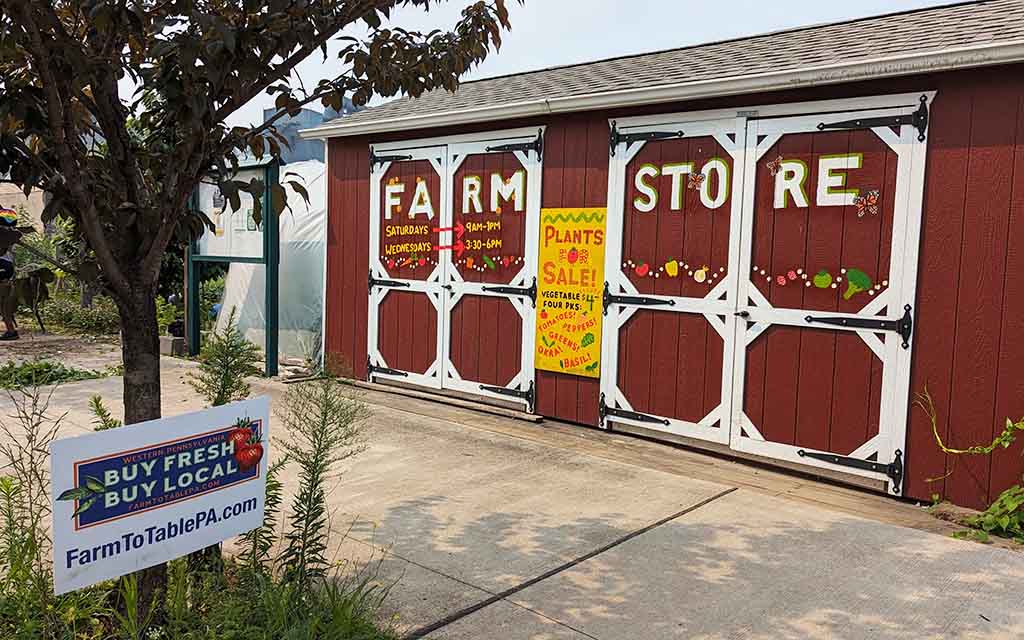
The Farm Store at Braddock Farms is open to the public several days a week.
“We’re trying to give a comprehensive and cohesive education that touches a little bit on everything in local food systems, as these teens are starting to really think about what they want to do after high school,” explains Vee Bleiweiss, development coordinator at Grow Pittsburgh. “In addition to farming and the farm markets, we do a lot of field trips and hands-on experiences. The goal with our UFIT program is to give the teens a sense of local food systems and where they can work within them. With everything that we do, we try to incorporate a ‘This is what it would look like to work here’ approach.”
Each week on the job broadens the students’ sense of the many facets of agriculture and offers them work experience and life skills that can be carried over into other types of employment.
“We take them to various food distribution factories and talk about what it looks like to work in a place like that,” Bleiweiss continues. “We take them to PNC Park—Grow Pittsburgh manages the rooftop garden there for the Pirates—and talk about what it looks like to work at PNC Park. We have representatives from PNC Bank come in and do financial literacy courses. We talk about entrepreneurship. We meet with local farmers and small business owners to talk about some of the ways that they got where they are, the struggles that they’re facing, and their advice for teens that want to start their own businesses.”
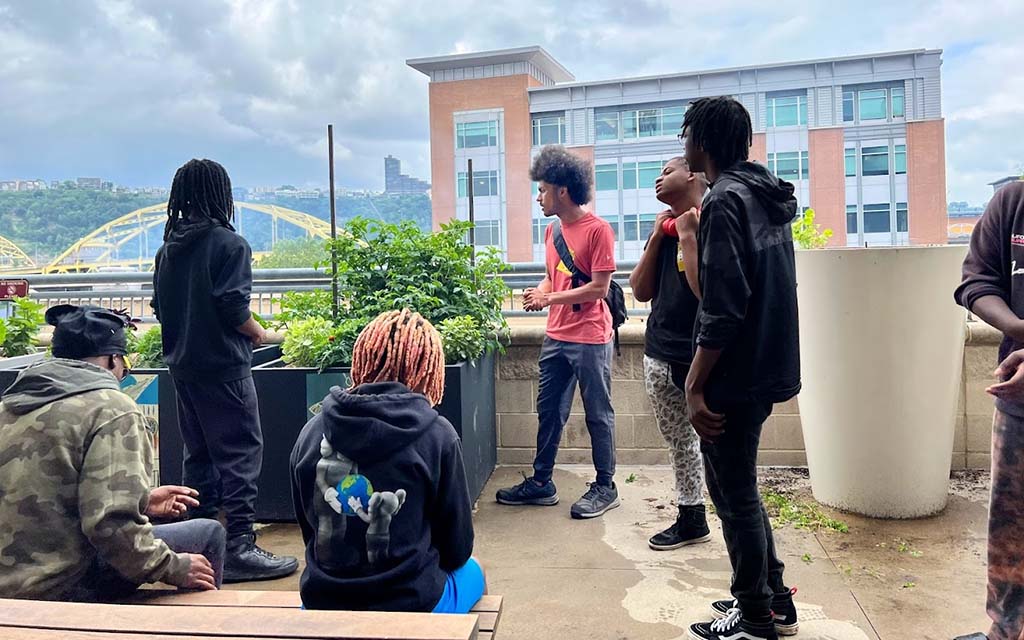
Teens visit the rooftop garden at PNC park. Image courtesy of Grow Pittsburgh.
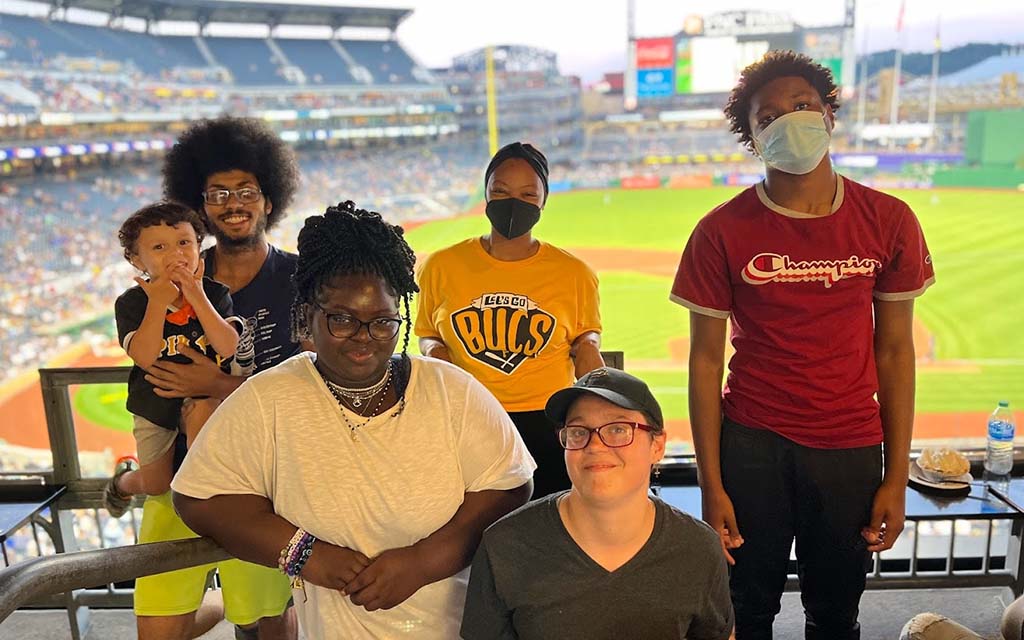
UFIT teens and company during a ballgame at PNC park. Image courtesy of Grow Pittsburgh.
The program is comprehensive, and continues even as the seasons change. Once the farm has been winterized, lessons continue at the Nyia Page Community Center, where the students learn about seed saving, medical tincture making, garden planning and organization, and run through seed catalogs, among other lessons.
Beyond the practical lessons learned, the program also has a focus on deep ties to the community.
“Grow Pittsburgh partners with a lot of local farmers and urban ag groups,” Bleiweiss notes. “And one thing that’s unique about the Homewood UFIT Program is that we are part of the Homewood Food Access Working Group, which is a collaborative with five Black-led nonprofits—Black Urban Gardeners and Farmers of Pittsburgh, Oasis Farm & Fishery, Grow Pittsburgh, Sankofa Village Community Garden, and Operation Better Block—focused on increasing racial equity and food access in the Homewood neighborhood. All five organizations are focused on urban agriculture, youth and community education, and addressing issues of food access and insecurity. Our UFIT teens will visit each site, working with participants from the other programs, to demonstrate the full scope of urban agriculture in their community.”
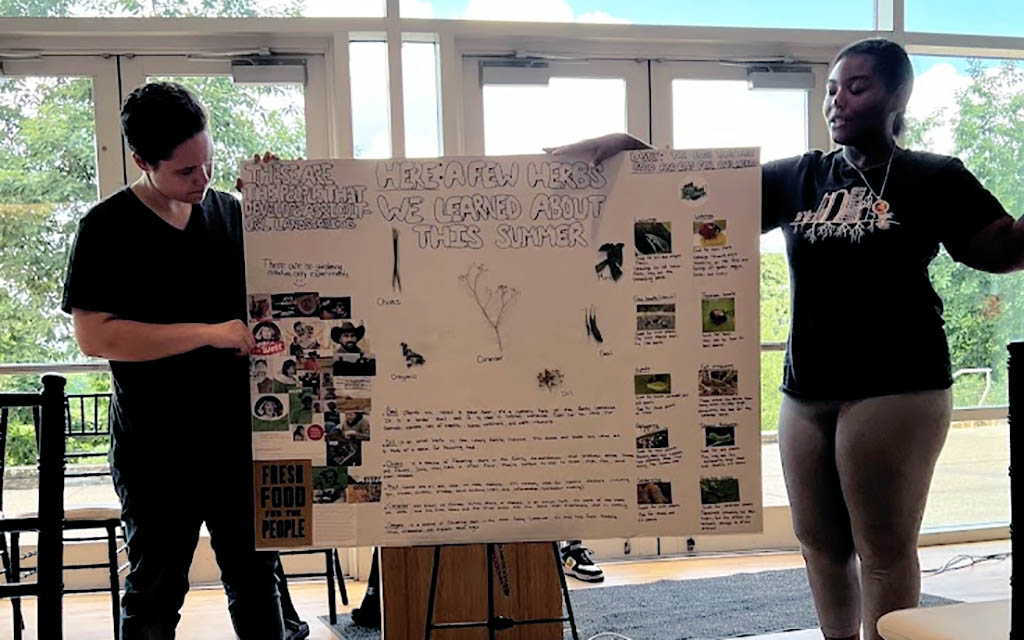
Teens present about herbs during the Youth Garden Summit, organized by the Youth Leadership Council. Image courtesy of Grow Pittsburgh.
The UFIT program also includes a Youth Leadership Council, which involves up to ten youths from urban agriculture organizations across the city. Over the course of five, paid planning sessions that focus on leadership development, the teens work together to plan an annual Youth Garden Summit. During this summit, ten local youth organizations come together to share with each other their newfound knowledge and experiences from their summer programs. Each organization delivers a teen-created presentation, participates in group bonding activities, and receives a private tour of Phipps Conservatory.
Grow Pittsburgh also offers multiple other avenues for students and community members of all ages to get involved with urban agriculture. From school and community gardens to their pre-apprenticeship program, the organization is on a mission to support food-growing initiatives and programs across the region as a key way to improve the social, economic, environmental, health, and educational realities of people in the Pittsburgh community.
This mission pays dividends in fresh produce. In 2022, through their urban farms and programs, Grow Pittsburgh grew and distributed 34,094 pounds of food, 28,034 of which was sold at their low-cost farm stands and 6,060 donated to local food pantries and free food distributions. Their farm stands served 4,443 customers in Wilkinsburg, Braddock, Homewood, and North Point Breeze.
They offer plenty of ways to celebrate as well. Each year, Grow Pittsburgh hosts a Zucchini Festival and a Fall Festival—harvest-themed parties open to the public with games, activities, music, and of course, great food.

The scene at Grow Pittsburgh’s Garden Get Down. Image courtesy of Grow Pittsburgh.
On Wednesday, August 23, Grow Pittsburgh will also be hosting their annual Garden Get Down, a fundraiser that brings together community members and gardeners for a fun-filled night of fresh local food, specialty drinks, dancing, and garden-related activities. This all-ages party is a great way to connect with local gardeners and farmers. Party-goers can learn about Grow Pittsburgh’s work to increase food security or just enjoy a great meal and break it down on the dance floor with some friends.
Regardless of your gardening status, Bleiweiss hopes you’ll consider stopping through. “It’s a big party that brings together community and backyard gardeners, UFIT and farm apprentice participants, garden educators from local schools, and farm stand customers to celebrate the incredible urban agriculture and fresh-food access work happening across our city. It’s a great way to connect with the local community, whether you’re a gardener or not—plus there’s fun music, art activities, and great food!”

Party-goers at the Garden Get Down show off their screen prints. Image courtesy of Grow Pittsburgh.
Visit growpittsburgh.org for a variety of garden and farm resources, information on urban farms, event details, volunteer opportunities, and more!
About the Mini-Grant Program
Rivers of Steel’s Mini-Grant Program assists heritage-related sites and organizations as well as municipalities within the Rivers of Steel National Heritage Area to develop new and innovative programs, partnerships, exhibits, tours, and other initiatives. Funded projects support heritage tourism, enhance preservation efforts, involve the stewardship of natural resources, encourage outdoor recreation, and include collaborative partnerships. Through these efforts, Rivers of Steel seeks to identify, conserve, promote, and interpret the industrial and cultural heritage that defines southwestern Pennsylvania.
The Rivers of Steel National Heritage Area is one of twelve supported by the Pennsylvania Department of Conservation and Natural Resources (DCNR). Funding is provided via DCNR’s Community Conservation Partnerships Program and the Environmental Stewardship Fund to Rivers of Steel, which administers the Mini-Grant Program.
 Gita Michulka is a Pittsburgh-based marketing and communications consultant with over 15 years of experience promoting our region’s arts, recreation, and nonprofit assets.
Gita Michulka is a Pittsburgh-based marketing and communications consultant with over 15 years of experience promoting our region’s arts, recreation, and nonprofit assets.
If you’d like to know more about community projects supported by the Mini-Grant Program, check out the latest round of awards.

